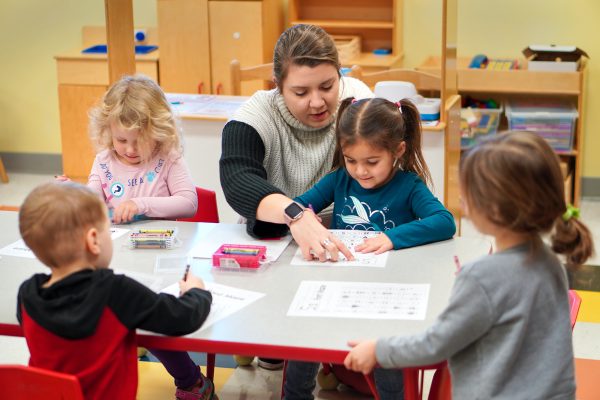Diocesan Catholic schools seeking teachers

Katie Frangenberg, a pre-school teacher at St. Francis of Assisi School in Wichita assists a student. (Photo courtesy Jessie Nielsen)
Interested in teaching?
If you or anyone you know might be interested in teaching in the Diocese of Wichita, call the Catholic School Office at 316-269-3950. Teacher openings can be found at ComeTeachWithUs.com.
Superintendent of Catholic Schools Janet Eaton is asking educators in the Diocese of Wichita to prayerfully consider a message she is promoting:
Come teach with us!
There are 783 teachers in the 38 Catholic schools in the diocese, she said last week. “These teachers, mostly Catholic, but not all Catholic, have the daily experience of working in an environment where Jesus Christ is at the center, where parent support is like none other, and where the morals and values that we want our young people to have are the priority of every day.”
Catholic school teachers are cherished
Catholic school teachers are highly valued, Eaton said.
“Those who are considering being a teacher, who have stepped away from teaching, or are teaching somewhere other than in a diocesan school will find that their souls would be nourished day in and day out working with the youth of the diocese.”
The state-wide teacher shortage is being felt by diocesan Catholic schools, she said. “To that end, Kansas has created many new pathways for individuals to gain their teacher certification. For example, for individuals who may have a degree in something other than education or for individuals who have not finished their degree, many universities now have tracks for these prospective teachers.”
Different teaching tracks open
Several individuals working in diocesan Catholic schools are in those prospective teacher tracks, Eaton said.
“As of this time we have around 40 positions open for the next school year. They range from teaching preschool to high school in rural schools and inner city and metro schools. The many rural communities, such as Parsons, Newton, Coffeyville, and Arkansas City, are especially in need of applicants.”
The advantages of teaching in a Catholic school are numerous – and eternal, the superintendent said.
“First and foremost, we help young people develop a love for Jesus Christ. In addition, our teachers do not follow a day-to-day scripted curriculum. While we have a curriculum, teachers have immense autonomy. We want the priority for teachers to be focused on individual student needs, not the expectation to be on a particular page on a particular day as is often the case with a scripted curriculum.”
Eaton said diocesan Catholic school teachers are blessed to work in an environment where good student behavior is modeled by hard working students, where there is a collegiality among peer teachers supported by administrators and parents willing to assist wherever needed.
Some Catholic schools welcome non-Catholic teachers, she said. “We strive for our non-Catholic teachers to feel comfortable, and we believe that they make a large impact in our students.”
Salary and benefits being addressed
Easton said she understands that part of the consideration in choosing to teach in a Catholic school regards salary and benefits.
“It is important for everyone in the diocese to know that we are making strides in this area. This past fall I was able to present to nearly all 38 school councils and many of the parish councils. I shared information about the specific school and I found that the more we are able to tell our story, the more transparent we are with the reality, the needs and the goals, the better. It has been my experience that parishes are continually giving attention to salaries and benefits.”
Eaton added that she has a long history connected to Catholic education. She grew up on a family farm near Kingman where her mother taught at St. Patrick School for many years.
“Since my very first day of teaching sixth grade at St. Elizabeth Ann Seton in Wichita I have never regretted my decision to work in Catholic education,” she said.
